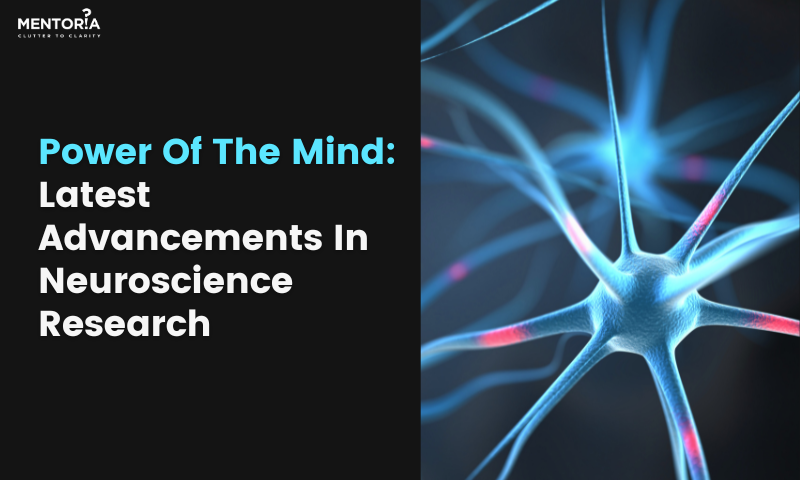Power Of The Mind: Latest Advancements In Neuroscience Research

Jump to Section
Have you ever wondered what goes on inside your brain? How do our thoughts, emotions, and memories shape our experiences? Well, get ready to dive into the fascinating world of neuroscience! In this blog, we’ll take you on an exciting journey through the latest advancements in neuroscience research. From mind-blowing discoveries to cutting-edge technologies, we’ll explore how scientists are unravelling the mysteries of the brain. So, put on your thinking caps, as we embark on a thrilling adventure into the depths of the mind. Whether you’re a science enthusiast, a student exploring potential career paths, or simply intrigued by the inner workings of the brain, this blog will leave you awe-inspired and craving for more knowledge. Get ready to expand your horizons and discover the incredible breakthroughs that are shaping the future of neuroscience!
The Power Of Neuroimaging: Peering Into The Brain’s Secrets
Did you know that the human brain generates enough electrical power to light up a small bulb? Although it may not be enough to illuminate an entire room, it’s fascinating to think about the brain’s incredible electrical activity. Neuroimaging has revolutionised our understanding of the brain, allowing scientists to delve into its intricate workings.
Techniques like functional magnetic resonance imaging (fMRI) and positron emission tomography (PET) enable us to observe brain activity in real time. We can now witness the neural pathways lighting up as we perform different tasks, experience emotions, or even daydream. These imaging techniques have unveiled the hidden realms of the brain, uncovering the neural basis of perception, memory, language, and more. By peering into the brain’s secrets, neuroimaging has the potential to transform fields like psychology, medicine, and even education.
Decoding The Language Of The Brain: Brain-Computer Interfaces
Imagine controlling a computer or a robotic arm with just your thoughts. That’s the power of brain-computer interfaces (BCIs). These cutting-edge technologies allow us to decode the electrical signals generated by the brain and translate them into commands. From helping individuals with paralysis regain mobility to enabling people to communicate through their thoughts alone, BCIs hold immense potential.
Have you ever wondered how fast information travels in your brain? Well, neurons, the cells responsible for transmitting signals, can send messages at speeds of up to 268 miles per hour (432 kilometres per hour)! That’s faster than the fastest roller coaster in the world. Recent advancements in machine learning and artificial intelligence have made BCIs more accurate and efficient, bringing us closer to a future where we can seamlessly merge our minds with technology. The possibilities are mind-boggling!
The Complexity Of Neural Networks: Connectomics
It’s often said that humans only use 10% of their brain, but this is actually a myth. In reality, we use our entire brain, although different areas may be more active at different times depending on the task at hand. The brain is a complex and interconnected organ, with each region playing a crucial role.
The brain is composed of billions of neurons interconnected in a mind-boggling network. Connectomics is the field dedicated to mapping and understanding these neural connections. By studying the intricate pathways and circuits that enable information processing, scientists hope to unravel the complexities of cognition and behaviour. Through advanced imaging techniques and computational analysis, connectomics provides insights into how different regions of the brain communicate and cooperate. This knowledge can lead to breakthroughs in understanding neurological disorders, enhancing artificial intelligence, and developing innovative treatments for brain-related conditions.
Neuroplasticity: Unlocking The Brain’s Adaptive Superpowers
Did you know that your brain is plastic? No, not like a water bottle. Neuroplasticity refers to the brain’s ability to change and adapt throughout your life. It can form new neural connections, reorganise existing ones, and even compensate for damage. This flexibility is what allows us to learn new skills, recover from injuries, and adapt to new environments. Gone are the days when we believed the brain was a static entity.
Neuroplasticity, the brain’s remarkable ability to reorganise and adapt, has captured the attention of researchers worldwide. It allows the brain to rewire itself in response to experiences, learning, and even damage. Through neuroplasticity, stroke survivors can regain lost functions, individuals can learn new skills, and the brain can recover from injuries. This groundbreaking discovery has opened up new avenues for neurorehabilitation, cognitive enhancement, and the understanding of how our brains shape our identities. It’s a testament to the brain’s remarkable resilience and adaptability.
Exploring The Gut-Brain Connection: Enter The World Of The Microbiome
Did you know that your gut has a profound influence on your brain? The emerging field of neurogastroenterology focuses on the intricate connection between the gut and the brain. Research has revealed that the trillions of microbes residing in our digestive system, collectively known as the microbiome, play a crucial role in our mental health and well-being. These microbes produce neurotransmitters, influence immune function, and communicate with the brain through the gut-brain axis. Understanding this complex interplay can lead to innovative therapies for mental disorders, dietary interventions for brain health, and a holistic approach to well-being.
Mindfulness And Meditation: The Neuroscience Of Inner Peace
In our fast-paced and hectic lives, finding moments of tranquillity can be a challenge. That’s where mindfulness and meditation come in. These practices, rooted in ancient traditions, have gained scientific recognition for their positive impact on mental health. Neuroscientists have discovered that regular mindfulness and meditation practices can reshape the brain, strengthening regions associated with attention, emotion regulation, and empathy while reducing stress and anxiety. The ancient wisdom of mindfulness is now backed by empirical evidence, highlighting its potential to promote mental well-being in today’s stressful world. So, take a deep breath, find your inner zen, and embark on a journey of self-discovery.
Research With Mentoria!
You’ve embarked on a mind-expanding journey through the latest advancements in neuroscience research. From the incredible power of neuroimaging to the fascinating world of brain-computer interfaces, you’ve witnessed the cutting-edge technologies and breakthroughs shaping the field. The mysteries of the brain are slowly being unravelled, opening up a world of possibilities for understanding and improving human cognition, mental health, and overall well-being. So, keep your curiosity alive, stay tuned to the ever-evolving field of neuroscience, and who knows, maybe one day you’ll be at the forefront of unravelling the next big discovery. Remember, the power of the mind knows no bounds, and together, we can unlock the secrets of the brain!
We’re here to provide you with all the help! Kick-start your journey with Mentoria and discover the right fit for you. Feel free to call us to speak to our career mentors and choose the right guidance plan that suits your needs.
Mentoria’s career guidance programme enables you to choose your perfect fit from 3 streams, 850+ courses, and 12,000+ careers, and discover what will bring out the best in you.









